Crimson Clover
An annual legume and true clover, traditionally sown in the south east of England for over-winter sheep keep.
Uses
Used as a winter forage in milder parts of the UK. It is also used as a green manure for soil improvements in gardens and allotments. More recently it has been included in cover crop mixtures for agricultural land improvement.
Persistence
This is a short term annual species.
Strengths
Quicker to establish than some longer term clovers, it is vigorous at the seedling growth stage and provides good forage for livestock.
Frost Tolerance
Not winter hardy.
Yield
3 - 4 t DM/ha on pure stands.
Sowing Rate Advice
6kg per acre / 15kg per ha.
Mixture Sowing Rate Advice
1 - 2kgs per acre / 2.5 - 5kg per ha
When mixing with Italian ryegrass.
Ideal Sowing Time
Sow in warm soils in spring and not late into the autumn.
Management
The plant will withstand light topping early in its life cycle, if needed to control annual spring weeds. Severe grazing or cutting will reduce yield, grazing or cutting during or just after flowering normally kills off the plant. It does not suffer from the same clover sickness issues as red clover.
Distinguishing characteristics
Seed
One of the larger true clover seeds, crimson clover is a smooth, rounded oval to spherical shape. It is usually a light brown colour reaching a length of 2.5-3mm.
Seedling
Crimson clover produces one of the largest seedlings of all the commonly used true clovers. The cotyledons are 7.5-8mm in length and 6-6.5mm wide, they grow on stalks which are about half the length of the cotyledon width. The first true leaves become hairy and larger than the cotyledons.
Flowering Plant
The stem and leaves are densely hairy, each leaf is on long stalks, which get shorter as you reach the top of the stem.
The leaves, hairy on both the top and underside also has a pronounced mid rib.
The stipules between leaf and stem are easily visible and membranous, sometimes fringed with purple.
The flower head is a rich crimson to red colour and shaped like a cone.
Each plant has a slender taproot, with lateral branches.
Additional Info
It takes about 3 months to flower from sowing (12 weeks), 3-4 weeks longer than persian clover. A larger seed than red clover. Average seeds per kg - 240,000.
Works well with
Westerwold or Italian Ryegrass as a forage, or other annual clovers for soil improvement.You can find Crimson Clover in the following mixtures
- Fast & Vast High Clover One - Two Year Ley
- Fast & Vast One - Two Year Ley 50% ORGANIC
- Summer Green Manure - Early Sown N Fixer
- Summer Quick Fix Mix
- Summer Quick Fix 50% ORGANIC
- Winter Cover Crop - Late Sown Winter Cover
- Winter Cover Crop - Late Sown Winter Cover - 50% ORGANIC
- Autumn Sown Bumblebird (AHW1/AB16)
- Two Year Grass/Legume Fallow (NUM3/CNUM3/AB15)
- 'LEGUME ONLY' Fallow Mixture (NUM3/CNUM3/AB15)
- Autumn Sown Two Year Grass/Legume Fallow (NUM3) 70% Organic
- Diverse Grazable Cover Crop (SOH2/SOH3/CSAM2/SAM2)
- Diverse Grazeable Cover Crop (SAM2) 50% Organic
- 'LEGUME ONLY' Fallow Mixture (NUM3) 70% Organic
- Short-term Fallow Mix (NUM3) 70% Organic
- Summer Green Manure - Early Sown N Fixer - 50% Organic
- Operation Pollinator Mix (AHL1/CAHL1/AB1)
- Annual Beneficial Insect Mix
- Vineyard Fertility Building Mix
- Vineyard Annual Fertility Building Mix 50% Organic
- Cornfield Annuals Mixture
- Flexi Game Cover 1 Year Mix 50% Organic
- General Purpose Game Mix 50% ORGANIC
- Cotswold Partridge Game Mix
- Cotswold Partridge Mix 50% Organic








